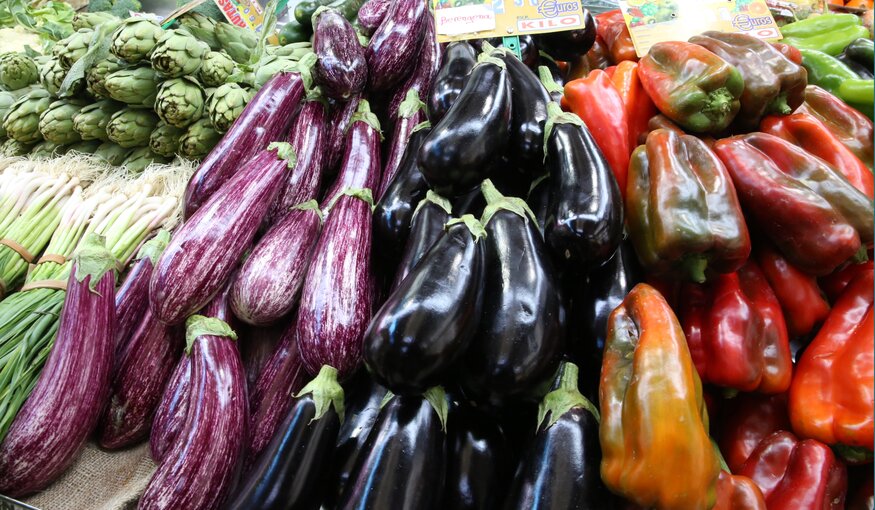3 August 2022
 Eggplants are delicious and nutritious, but they're under threat. The Crop Trust facilitated the development of a global strategy to ensure eggplant can stay on our plates – forever.
Eggplants are delicious and nutritious, but they're under threat. The Crop Trust facilitated the development of a global strategy to ensure eggplant can stay on our plates – forever.
The Crop Trust facilitated the development of a global strategy to conserve the diversity of eggplant and its wild relatives to help ensure food and nutrition security.
If there was a contest for the most glamorous vegetable, and there certainly should be, eggplant would be a strong contender.
There’s so much more to it than the deep, glossy black or rich purple fruit we see in most grocery stores. Eggplants can be green, lilac and even white. Some eggplant varieties protect their fruit with sharp spines; some are big, some small; some long, others round.
And there’s an equally wide range of foods that feature the eggplant. We enjoy it in stews, baked dishes, dips and curries all around the world.
Common eggplant (Solanum melongena), also known as brinjal eggplant or aubergine, has an almost world-wide distribution. Two other species, scarlet eggplant (Solanum aethiopicum) and gboma eggplant (Solanum macrocarpon), are widely grown in Africa.
Other minor vegetables and fruits in the eggplant genepool include Solanum torvum, which features in Thai curries and is also used as a rootstock for tomato, Solanum scabrum and Solanum americanum, which are traditional leafy vegetables consumed in sub-Saharan Africa and southeast Asia, and Solanum quitoense (naranjilla) and Solanum sessiliflorum (cocona), fruits grown in South America.
But this delicious – and nutritious – crop is under threat.
Threats and challenges
Globally, crops and their wild, uncultivated relatives are threatened by the changing climate. Pest damage and disease outbreaks are predicted to become more severe, as are severe weather events like floods and droughts. At the same time, a growing world population means we need to produce more food than ever before.
Part of the solution is breeding programs that produce new, resilient varieties of our favorite crops.
Eggplant is no different. Its wild relatives are threatened by the changing climate and all the other drivers of biodiversity loss, including land-use changes. Local eggplant landraces, also known as heirloom varieties, are replaced by modern varieties, or even other crops, as growers try to increase returns. But the diversity of these landraces and wild relatives is the raw material needed by plant breeders to adapt cultivated eggplants to the changing climate and develop resilient traits like drought and extreme heat tolerance, to increase yields and enhance nutritional qualities.
Without this diversity, we will not be able to breed new varieties that will survive and thrive as the world’s climate changes.
The mission of The Crop Trust is to safeguard crop diversity – all the plants we eat and their wild, uncultivated relatives – for everyone, forever. For that we need a plan. Eggplant is one of the key crops selected for the development of such a plan – a global conservation strategy – as part of a project generously funded by the German Federal Ministry of Food and Agriculture (BMEL).
A strategy for the global conservation of eggplant
The first step in developing the strategy was to get an overview of what is actually being done around the world. Surveys of global databases and consultations with genebanks that conserve eggplant collections revealed that brinjal eggplant, with more 12,000 different samples in collections, is much better represented than scarlet eggplant (886) and gboma eggplant (209).
Such less well familiar species, and also wild relatives, are stored in some genebank collections, but the coverage is patchy and many species are either poorly represented or not yet conserved at all. Other problems identified by collection holders included pests and diseases, funding and staff shortages, gaps in collections and insufficient documentation and backing-up of the stored seeds.
The nitty gritty of the strategy
Having described the current conservation landscape, the strategy recommends establishing a global working group with representatives from both genebanks and breeding and research institutions. It also recommends developing a knowledge platform to make information about stored eggplant seeds widely available to researchers, breeders and growers.
Collaborative research programs should establish protocols to reduce the risks of seed-borne diseases, and characterize different eggplant samples in terms of their genetic make-up, growth and yield characteristics, disease resistance and morphology. The new protocols and information will be added to the knowledge platform and other databases.
Strengthening collaborations
The strategy aims to support existing international collaborations to curate and conserve eggplant resources, including local varieties, wild relatives, relatively neglected species and pre-breeding materials that scientists have developed as a source of beneficial traits for breeding programs.
The bigger genebank collections will be key global players in collection and conservation activities, while smaller collection holders can contribute by safeguarding national varieties and backing-up their eggplant materials in larger collections.
With better information available for stored eggplant resources, all collection holders can connect those requesting seeds with the network of genebanks that make up the global eggplant community. This ties in with another important goal to promote the use of eggplant diversity in breeding and pre-breeding programs. In collaboration with research institutions and the breeding industry, existing collections should be regenerated and duplicated for safety.
All of these goals will require upgrading of facilities, skills and documentation, as well as strong collaborations among researchers, breeders, growers and industry. The strategy calls for an international system to be established to provide technical and financial support for these activities.
Altogether, the strategy provides a roadmap to ensure eggplant can stay on our plates – forever.
Learn more and read the full strategy.